
A large Ukrainian manufacturer of corrugated cardboard – Poninkovskaya Cardboard and Paper Factory-Ukraine (“PKBF-Ukraine”, Khmelnytsky region) produced products worth UAH 1 billion 526 million in January-August, which is 12.2% more than in the same period of 2021 of the year.
According to the statistics of the UkrPapir association provided to the Interfax-Ukraine agency, in physical terms, the factory reduced the production of containerboard (including corrugating paper) by 19.2% – to 48.3 thousand tons, and by 17.6% corrugated boxes from it – up to 43.1 million square meters. m.
At the same time, paper production increased by 72% – up to 381 tons.
At the same time, in August, the production of corrugated packaging by the factory decreased by 9% compared to August 2021, to 6.9 million square meters. m, paper and cardboard – by 2%, up to 8.1 thousand tons.
The Ponikovskaya Factory (formerly the Ponikovsky Cardboard and Paper Mill), once the largest manufacturer of school notebooks, currently has one main production – paper and cardboard, mainly produces corrugated packaging, as well as wrapping, waste paper.
The factory is part of the United Cardboard Company-Ukraine (UCC, Lutsk), whose production assets include, in particular, Lutsk KBF-Ukraine (Volyn region), which reduced the production of cardboard by 22% in January-August – to 33, 4 thousand tons.
As reported with reference to data collected by the association from industry companies, in January-August, taking into account the fact that a number of enterprises in the industry were either destroyed or damaged or located in the occupied territory, the production of paper and cardboard in Ukraine decreased by 43.2% compared to with the same period last year – up to 336.7 thousand tons, corrugated packaging – by 42.2%, up to 282.3 million square meters. m.
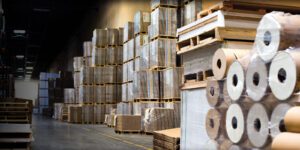
Cardboard and Paper Company LLC (Lviv), a major Ukrainian manufacturer of cardboard sleeves and sanitary and hygienic products, in January-August increased its production by 44.2% compared to the same period in 2021 – up to 724, UAH 94 million
According to the statistics of the UkrPapir Association, provided to the Interfax-Ukraine agency, the company thus maintains an increase in this indicator (more than 44%) compared to the same period last year (according to the results of 7 months, it was 44.7%).
In pack terms, the company increased the output of base paper for sanitary products by 8.5% to 4.8 thousand tons, while increasing the output of toilet paper in rolls by 42.8% to 2.65 million pieces.
The output of cardboard products increased by 2.7% – up to 17.8 thousand tons.
At the same time, in August, the factory increased the production of paper and cardboard by 23% compared to August 2021 – up to 3.16 thousand tons.
As reported with reference to the statistics of UkrPapir, the factory continued to work all months from the beginning of the year, reducing the production of paper and cardboard in March (by March 2021), but in April it already switched to positive dynamics, which it maintained in the following months.
Cardboard and Paper Company (until 2011 – Lvivkartonoplast) produces products and semi-finished products from recycled cardboard (cardboard sheets, corners, sleeves), cellulose and recycled waste paper (toilet paper, towels, napkins (TM Papero).
In 2021, the company produced products worth UAH 782.7 million, which is 47% more than a year earlier.
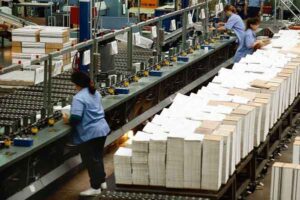
Zhydachevsky Pulp and Paper Mill (ZhTsBK, Lviv region), which is part of the Osnova holding, in January-August 2022 increased its production by 30.1% compared to the same period in 2021, to UAH 333.47 million.
According to the statistics provided to the Interfax-Ukraine agency by the UkrPapir Association, thus, following the results of eight months, the plant slightly slowed down the growth rate of this indicator compared to the same period last year (for six months it was 40%, for seven – 35, one%)
In real terms, the production of corrugated boxes continues to maintain stable positive dynamics, having increased by a third – up to 12.7 million square meters. m. At the same time, the output of containerboard (including corrugated paper) decreased by 9.3% to 8.6 thousand tons.
At the same time, a significant reduction in the production of paper remains – by 38.4%, to 2.75 thousand tons.
As reported, in January-August, taking into account the fact that a number of enterprises in the industry were either destroyed or damaged or located in the occupied territory, the production of paper and cardboard decreased by 43.2% compared to the same period last year – to 336, 7 thousand tons, corrugated packaging – by 42.2%, up to 282.3 million square meters. m.
At the same time, the largest Ukrainian manufacturer of corrugated packaging, Rubezhsky CPC, was damaged and stopped, but its subsidiary in the Kyiv region, the Trypilsky Packaging Plant, continues to work. According to UkrPapir, in eight months it produced products worth UAH 1.31 billion, and corrugated packaging produced 78.5 million square meters. m (the second indicator after the Kyiv KBK).
ZhPPM with the beginning of Russia’s military aggression against Ukraine, like many enterprises in the industry, suspended work due to a break in supply chains and a danger to employees. However, production was resumed in March.
According to the association, another plant in the structure of the holding “Osnova” – Izmail pulp and cardboard (Odessa region) in January-August increased the volume of marketable products by 6.5% – up to UAH 148.7 million. In physical terms, the output of containerboard decreased by one third to 5.4 thousand tons, corrugated packaging by 44%, to 7.7 million square meters. m.
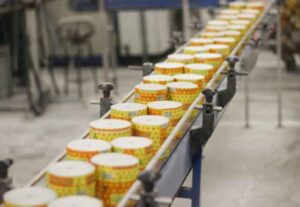
Kokhavinskaya paper mill (KBF, Lviv region), which produces sanitary and hygienic paper products (TM “Kokhavinka”), in January-August 2022, produced products worth UAH 601.5 million, which is 40% more than in the same period of 2021 of the year.
According to the statistics of the association “UkrPapir”, provided to the agency “Interfax-Ukraine”, thus, the factory has practically retained the rate of increase in production volumes, recorded for seven months (40.1%).
In natural terms, the production of base paper for sanitary and hygienic products increased by 3% – up to 27.3 thousand tons.
At the same time, the production of toilet paper in rolls increased by 16.4% – up to 87.2 million pieces, which remains the second largest indicator after the Kyiv KBK (221.6 million pieces).
In general, the main enterprises of the industry during this period produced 383.5 million rolls (-16.8% compared to January-August 2021).
KBF, which has been operating since 1939, produces base paper for sanitary and hygienic products, as well as toilet paper and paper towels. The capacity of paper machines is 19 thousand tons per year, processing equipment is 90 million rolls per year.
The factory has practically not stopped production since the beginning of this year.
KBF in 2021, according to UkrPapir, increased the volume of production of marketable products by 13% compared to 2020 – up to UAH 673.7 million. Net profit decreased by 29% – to UAH 60 million.
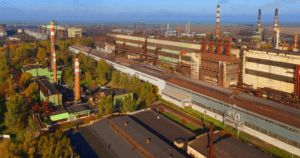
Nikopol Ferroalloy Plant (NZF, Dnepropetrovsk region) in January-July this year reduced its output by 19.1% compared to the same period last year – up to 307.67 thousand tons.
As Interfax-Ukraine was informed by the Ukrainian Association of Ferroalloy Producers (UkrFA), for 7 months NFP reduced the production of silicomanganese by 13.3% – to 302.19 thousand tons, ferromanganese and other ferroalloys – by 82.7%, to 5.48 thousand tons (including ferromanganese produced 4.87 thousand tons).
In July, 39.7 thousand tons of ferroalloys were produced.
As reported, in 2021 NFP increased its output by 26% compared to the previous year – up to 646.68 thousand tons. At the same time, the plant increased the production of silicomanganese by 28% – up to 600.64 thousand tons, ferromanganese – by 4.9%, up to 46.04 thousand tons.
The average monthly output of ferroalloys with the stable operation of the enterprise is about 55-60 thousand tons.
NZF is the largest enterprise in Ukraine for the production of silico- and ferromanganese. Uses imported and domestic raw materials for the production of ferroalloys.
NZF is controlled by the EastOne group, created in the fall of 2007 as a result of the restructuring of the Interpipe group, as well as the Privat group (both Dnipro).
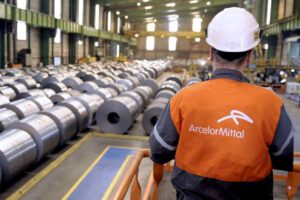
PJSC ArcelorMittal Kryvyi Rih (Dnipropetrovsk region) at its coke chemical division in January-July this year reduced production of metallurgical coke by 59.4% compared to the same period last year, to 696,700 tonnes.
A representative of the company told Interfax-Ukraine that in July the company produced 43,500 tonnes of metallurgical coke.
At the same time, in January-July 2022, production of 6% moisture gross coke at the plant amounted to 800,000 tonnes, including 51,000 tonnes in July.
Coke production at ArcelorMittal Kryvyi Rih over seven months of 2021 increased by 11.9%, to 1.716 million tonnes, including 257,000 tonnes in July last year.
In January-July 2022, the company received 216,000 tonnes of domestic coal, 390,000 tonnes from Russia (before the war), 65,000 tonnes from Kazakhstan, 27,000 tonnes from Poland, 15,000 tonnes from the Czech Republic, 190,000 tonnes from the USA and 126,000 tonnes from Australia. In July, the plant delivered 68,000 tonnes of domestic coal, 32,000 tonnes from the United States, and 4,300 tonnes from Australia.
ArcelorMittal Kryvyi Rih is the largest producer of rolled steel in Ukraine. It specializes in production of long products, in particular rebar and wire rod.